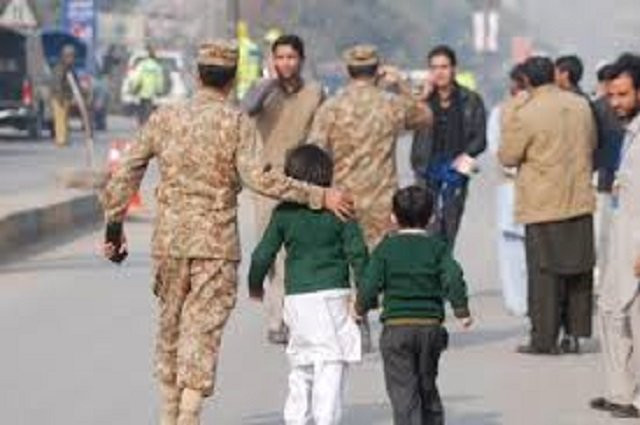The incalculable cost of terror
It has been a war of survival and Pakistan will be seen on the right side of history as it is chronicled

Unofficial estimates say this cost of security rose exponentially after the APS massacre of 2014. PHOTO: Reuters
According to reliable studies, the human fatalities of war against terror in 2015 were in excess of 80,000, a number that has surely risen since then. The war that followed in the wake of the 9/11 attack eroded investor confidence and adversely effected Pakistan’s economy. It is assessed, averaging open source information estimates, that since 2001 the country has suffered capital losses equivalent to, or in excess of, $130 billion. The much-touted international assistance only accounted for a fraction of these losses and the intensity of conflict directly affected the GDP growth of the country that saw the sharpest dip between 2008-10.
Due to dwindling investor confidence, there was also a sharp decline in FDI levels. After May 1998, the inflow of FDI into Pakistan touched its lowest level at $322 million in 2000-01. In the aftermath of 9/11, the situation improved slightly and FDI touched $5,410.2 million in 2007-08. The financial crisis in the US coupled with the war at home saw FDI again dip to $3,719.9 million in 2010 and at present it stands at a mere $2,761 million.
Another tangible effect has been a rising trend in inflation and the depreciation of rupee because of the slowdown of economic activities. Over the last 17 years, inflation alarmingly increased to 21% in 2008-09 from 10.3% in 2007-08. Core inflation rate since 2010 has averaged at 7.54%, and the rupee continues to face relentless pressure in the international market.
In a society where education and critical thinking have largely been curtailed, such a war further complicates the growing trends and patterns of radicalisation with acute fallout in the psychological and social realm. Due to military operations in various parts of K-P and Fata, 2.7 to 3.5 million people were displaced — considered as the largest internal displacement in Pakistan’s history. Local residents, particularly women and children of the conflict areas, suffered critical physical and psychological abuse and trauma due to this dislodgment. This has severely impacted national productivity, creativity, entrepreneurship and youth personal development. Severe mental illness has also been associated with health risk factors to the extent that the WHO has predicted that depression will soon become the second leading cause of death.
From 2001 to 2011, the country witnessed an almost 100% increase in the incidence of mental illness. These findings suggest that living under the threat of a potential terrorist attack is powerful enough to interfere with the daily functioning of the population, regardless of an individual’s actual exposure to such trauma. While exact figures on suicides related to PTSD from terrorism may not be available, psychiatrists agree that these numbers have increased manifold in the last decade.
Education is another area hit hard by terrorism. Militants attacked and destroyed a number of schools in Fata and K-P as a strategy to lead the youth of the area astray. Militants attacked 119 schools in 2008, 188 in 2009, 129 in 2010 and 142 in 2011. In Swat, 401 schools were destroyed in 2010-11. The tuition fee subsequently rose in other institutions due to hiring of security personnel to maintain a notion of security for children at schools. Unofficial estimates say this cost of security rose exponentially after the APS massacre of 2014.
Intolerance, brain drain, loss of tourism, increase in crime rate and unemployment are just few of the other menaces that have been direct byproducts of the war on terror. It has been a war of survival and Pakistan will be seen on the right side of history as it is chronicled, however, we cannot afford this much longer and the terror must be quelled swiftly and perpetually.
Published in The Express Tribune, March 25th, 2018.
Like Opinion & Editorial on Facebook, follow @ETOpEd on Twitter to receive all updates on all our daily pieces.















COMMENTS
Comments are moderated and generally will be posted if they are on-topic and not abusive.
For more information, please see our Comments FAQ